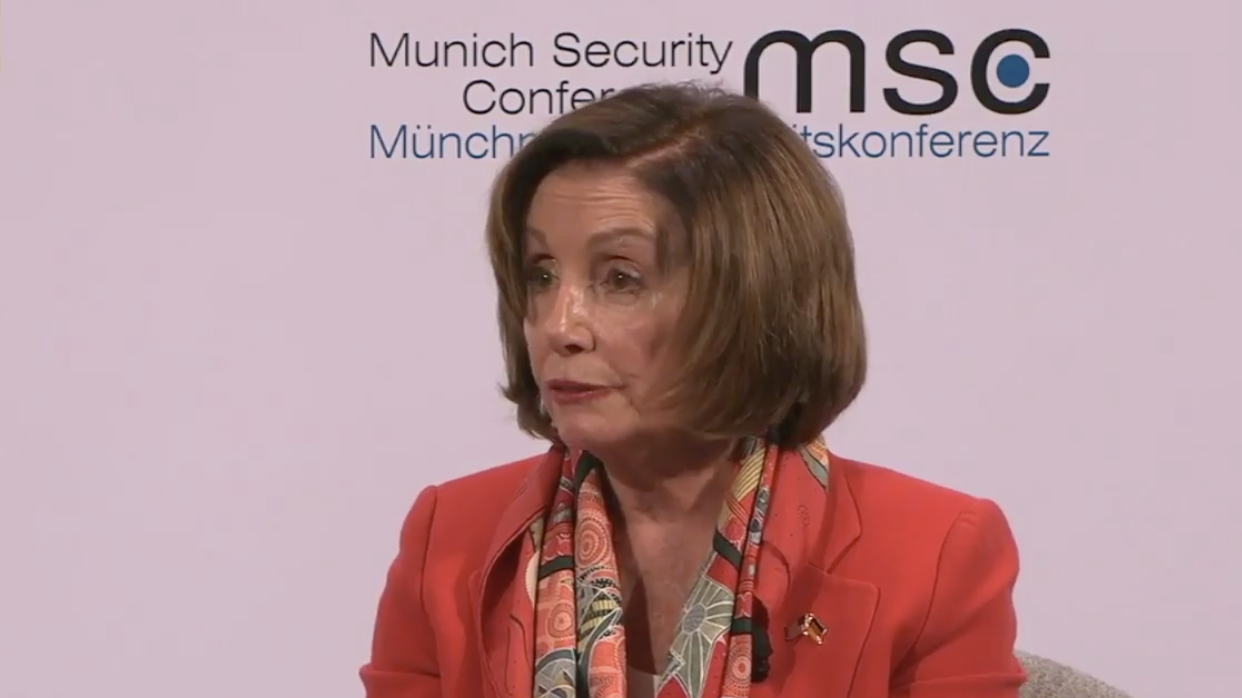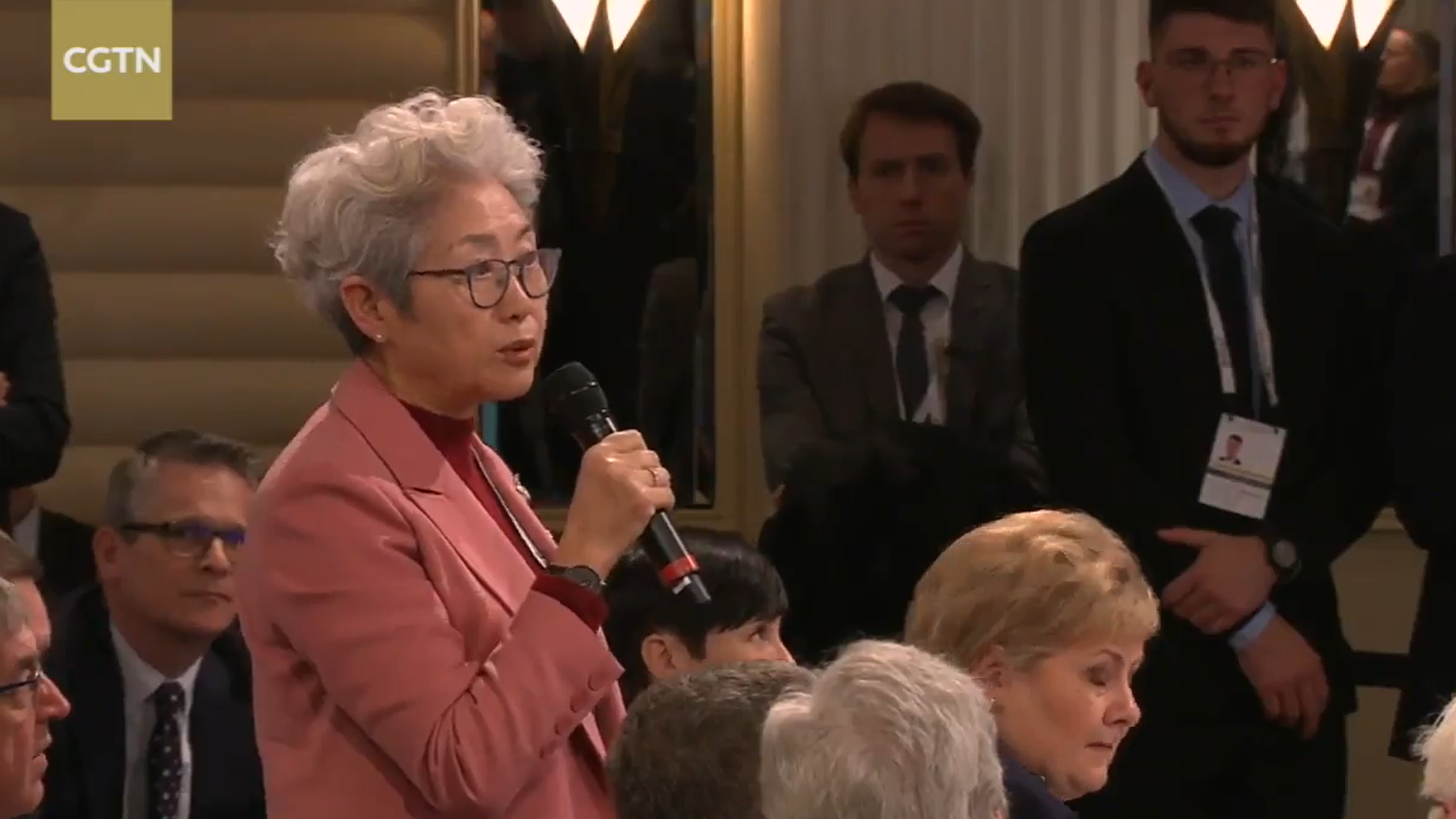
Screenshot of U.S. Speaker of the House Nancy Pelosi at the Munich Security Conference.
Screenshot of U.S. Speaker of the House Nancy Pelosi at the Munich Security Conference.
Nancy Pelosi has taken a staunch "China-threat" rhetoric during this year's Munich Security Conference. For her, choosing Huawei is tantamount to "choosing autocracy over democracy on the information highway." "Emulating the Chinese system" is a resounding no in Pelosi's judgement.
As a Democrat, this incumbent Speaker of the U.S. House of Representatives has emphasized multilateralism in international relationship. At this year's conference, she preached that the power to erode the democratic institution includes the rise of the Chinese system. For her, Huawei is the face and embodiment of such a "threat."
However, the act to equate technology, human rights and democratic values is questionable in itself. Speaker Pelosi sees that information is the core of democratic competition, and that the competition between democracies is a competition between technologies. The U.S., in Pelosi's argument, holds the moral high ground on technology and that only her country could use technology fairly without abusing its superiority.
Only, she seems to be forgetting Edward Snowden's revelation and it might not be polite or legal to listening to private conversations of other world leaders – including many of the U.S.' allies.
In America, there's a group of old-school parliamentarians, like Pelosi, whose views on technology still cannot escape the trappings of the Cold War. During congressional hearings on Facebook, some of the questions posed by congress people can even be answered by today's middle schoolers. Their detachment from today's technology makes them still ensconced in the belief that technology is used for spying and stealing. And exporting technology is exporting a set of political behaviors and believes. And China isn't on the list of accepted countries.

Screenshot from a video showing Fu Ying, a veteran Chinese diplomat and vice-chairperson of the Foreign Affairs Committee of the National People's Congress (NPC), challenging "Huawei ban" comments by U.S. House Speaker Nancy Pelosi at this year's Munich Security Conference.
Screenshot from a video showing Fu Ying, a veteran Chinese diplomat and vice-chairperson of the Foreign Affairs Committee of the National People's Congress (NPC), challenging "Huawei ban" comments by U.S. House Speaker Nancy Pelosi at this year's Munich Security Conference.
Which makes it less of a surprise that her response to a question from Chinese diplomat Fu Ying equates Huawei is much more about politics than technology itself. Her immediate pivot to emphasize U.S. rejection of the Chinese system and accusing China of human rights abuses and suppression of religious freedom demonstrates that her focus is not on tech, but on politics.
To Pelosi's credit, she admitted towards the end of her speech on the first day of the Munich Security Conference that her comments on Huawei might not be agreeable to many attendees. But, she is placing the blame on China instead of herself. She said that she has followed China for more than 30 years, and what she has followed has been what she believes is Chinese government violating her values in regions like Xinjiang, Tibet and Hong Kong. For her to take a look at China from a modern perspective could very well be too late given her entrenched opinion on a small fraction of the China-U.S. relationship. China's economic, military and now technological rise doesn't fit into her outdated lens.
It's not that she denies the cooperation between the two countries. When Fu Ying brought up the topic of climate change, she didn't hesitate to say that she had good meetings with the Chinese on this front. But her mindset regarding China doesn't allow her to contemplate that this form of cooperation could actually be the nature of the bilateral relationship. It only makes her reject China on a systematically level, making cooperation a rarity but confrontation a certainty in her view.
"Do you think the democratic system is so fragile that it could be threatened by this single hi-tech company of Huawei?" Fu Ying asked Pelosi. By painting a dark picture of China, the Speaker has said yes without saying the word. Often, politicians like Pelosi gets to get trapped in their own preconceived opinion that they don't see the gap in their knowledge. They can't follow the progression and the development of the modern world. And until the end of their career, they don't have any interest in learning about China's governance system and technology innovation, much less thinking about what they might be missing in their analysis.
(If you want to contribute and have specific expertise, please contact us at opinions@cgtn.com)